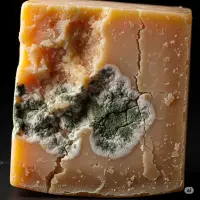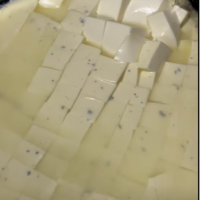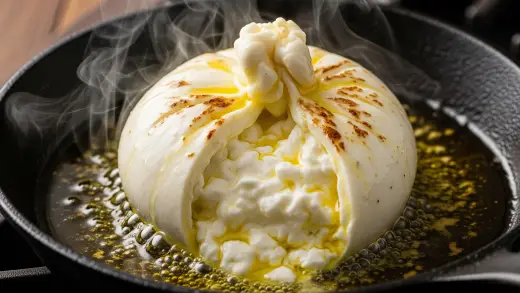Yes, you can freeze bocconcini cheese to prolong its shelf life. Freezing bocconcini cheese is a great way to extend its freshness and prevent it from spoiling too quickly.
Introduction for Do You Freeze Bocconcini Cheese
If you love experimenting in the kitchen, you might have wondered about freezing bocconcini cheese. It’s that soft, mild cheese that adds a special touch to many dishes.
But, here’s the question: Can you freeze bocconcini cheese? Let’s dig into this to see if freezing is a good way to keep this cheese fresh and tasty for longer. We’ll explore how freezing might affect it, and whether it’s a smart move to make your bocconcini last.
Indeed, it’s important to store the Bocconcini Cheese properly in an airtight container to maintain its quality. Bocconcini cheese, also known as “baby mozzarella,” is a fresh and soft cheese that adds a creamy texture to various dishes.
Whether you have an excess amount of bocconcini cheese or want to stock up for future use, freezing it can be a practical solution.
However, there are some important considerations to keep in mind when freezing bocconcini cheese to ensure it maintains its taste and texture.
Understanding the proper methods for freezing and thawing bocconcini cheese will help you enjoy its deliciousness even after it’s been frozen.
Freezing Bocconcini Cheese: Myth Or Fact
Freezing Bocconcini cheese – a common culinary conundrum that has left many cheese enthusiasts pondering the myth or fact behind preserving this delectable cheese variety. Let’s delve into this perplexing topic and uncover the truth about freezing Bocconcini.
Exploring The Common Query On Cheese Preservation
When it comes to preserving cheese, especially the beloved Bocconcini, there’s often confusion surrounding the freezing process.
Many individuals question whether freezing Bocconcini is a viable option for extending its shelf life. This query has sparked a heated debate in culinary circles, prompting us to unravel the mystery behind freezing Bocconcini cheese.
The Truth About Bocconcini’s Freeze-tolerance
So, is freezing Bocconcini cheese a myth or a fact? Contrary to popular belief, Bocconcini is indeed freeze tolerant. This traditional Italian cheese, known for its delicate texture and milky flavor, can be safely frozen without compromising its quality.
When storing Bocconcini in the freezer, it’s essential to adhere to proper guidelines to ensure optimal preservation and taste.

Credit: youtube.com
Understanding Bocconcini Cheese
Bocconcini cheese is a soft and mild Italian cheese that is a staple in many dishes, such as salads and appetizers. Understanding the characteristics of bocconcini cheese is essential for knowing whether it can be frozen without losing its quality.
Let’s dive into the defining characteristics of bocconcini cheese to better understand its nature and how freezing may impact its freshness.
Characteristics Of Bocconcini
Bocconcini cheese is a type of fresh, unripen mozzarella cheese that is made from buffalo or cow’s milk. It is typically formed into small, egg-sized balls and has a smooth, delicate texture. The cheese has a slightly tangy and milky flavor, making it a versatile ingredient in a variety of dishes.
Bocconcini cheese is known for its ability to absorb flavors, making it a popular addition to salads, pizzas, and pasta dishes.
Freshness As A Defining Quality
The defining quality of bocconcini cheese is its freshness. Due to its delicate nature, bocconcini cheese is best enjoyed when it is at its freshest. The soft texture and subtle flavors are at their peak when the cheese is freshly made.
Freezing bocconcini cheese may affect its texture and flavor, potentially altering its characteristic creaminess and taste. When considering whether to can you freeze bocconcini cheese, it is crucial to understand the impact on its freshness.
Proper Storage Techniques for Bocconcini
Bocconcini, a delightful type of Italian cheese, has a delicate texture and flavor that can be compromised if not stored properly.
To maintain its freshness and taste, it’s essential to understand the importance of temperature control and the ideal conditions for preserving bocconcini cheese.
Importance Of Temperature Control
Maintaining the right temperature is crucial for preserving the quality of bocconcini cheese. Sudden temperature fluctuations can lead to spoilage and affect the texture and taste of the cheese.
When exposed to higher temperatures, the cheese can lose its moisture and become rubbery. On the other hand, excessively cold temperatures may cause the cheese to harden or develop freezer burn.
Ideal Conditions For Maintaining Quality
- Store bocconcini cheese in its original packaging or airtight container to prevent exposure to air and moisture loss.
- Maintain a consistent temperature of around 39°F to 46°F (4°C to 8°C) to preserve the cheese’s texture and flavor.
- Avoid storing bocconcini cheese near strong-smelling foods as it can absorb odors, impacting its taste.
- Consume the cheese within a few days of opening for the best flavor and texture.
Do You Freeze Bocconcini Cheese: Tips for Preserving Freshness
When it comes to bocconcini cheese, it’s important to know how to preserve its freshness to ensure it retains its delicious taste and texture. Freezing bocconcini can be a useful way to prolong its shelf life, but it’s essential to do it correctly to maintain its quality.
Assessing The Impact On Taste And Texture
Before freezing bocconcini cheese, it’s crucial to understand how it may affect its taste and texture. Freezing bocconcini can alter its texture and may cause it to become slightly crumbly after thawing.
However, the overall taste can still remain intact, making it suitable for certain dishes such as cooked pasta or pizza.
Step-by-step Guide To Freezing Bocconcini
- First, ensure that the bocconcini cheese is fresh and within its expiration date.
- Gently pat dry the bocconcini to remove any excess moisture, as moisture can lead to freezer burn.
- Place the bocconcini in an airtight container or heavy-duty freezer bag, ensuring it is tightly sealed to prevent air exposure.
- Label the container or bag with the date of freezing to keep track of its freshness.
- Place the container or bag in the freezer, ideally in the coldest part or a deep freezer to maintain its quality.
By following these steps, you can preserve the freshness of bocconcini cheese and ensure it remains suitable for various culinary uses even after freezing.
Alternative Preservation Methods

When it comes to preserving Bocconcini cheese, freezing is not the only alternative. There are other methods that can help extend the shelf life of this delicious cheese.
In this section, we will explore alternative preservation methods for Bocconcini cheese to ensure it stays fresh for longer periods.
Refrigeration Do’s And Don’ts
Proper refrigeration is crucial in keeping Bocconcini cheese fresh. Do store the cheese in its original brine or in a fresh brine solution. This helps maintain its moisture and flavor.
Don’t keep it in the coldest part of the refrigerator as it can freeze, impacting the texture and taste of the cheese.
Using Oil Or Herbs For Extended Freshness
Another effective method for extending the freshness of Bocconcini cheese is to coat it in oil or herbs. Coating the cheese in olive oil creates a barrier that helps prevent moisture loss and can also impart additional flavor.
Using herbs such as basil, oregano, or thyme not only adds a fragrant aroma but also acts as a natural preservative, enhancing the cheese’s shelf life.
Signs Bocconcini Is Past Its Prime
Bocconcini cheese, known for its soft and delicate texture, can be a delightful addition to a variety of dishes. However, like all perishable foods, it is important to ensure that it is still safe for consumption. Here are some signs to look out for to identify if your bocconcini cheese has gone bad.
Identifying Spoilage In Cheese
When assessing whether bocconcini cheese has spoiled, there are some key indicators to look for:
- Changes in appearance: Check for any mold growth or an unusual slimy texture.
- Unpleasant odor: If the cheese emits a sour or off-putting smell, it may be a sign of spoilage.
- Texture: A gritty or slimy texture can indicate that the cheese has gone bad.
- Taste: If the cheese tastes sour, bitter, or generally unpleasant, it is likely no longer safe to eat.
Safety Considerations For Consumption
It is crucial to prioritize food safety when assessing whether bocconcini cheese is still suitable for consumption. As a perishable dairy product, consuming spoiled cheese can lead to foodborne illnesses.
If you notice any of the aforementioned signs of spoilage, it is advisable to discard the cheese immediately to avoid the risk of foodborne illness.
When in doubt, it is best to err on the side of caution and refrain from consuming bocconcini cheese that shows any signs of spoilage. Prioritizing food safety is essential to ensure a pleasant dining experience and avoid potential health concerns.
Thawing Frozen Bocconcini Cheese
Bocconcini cheese, with its creamy texture and mild flavor, is a versatile ingredient in many dishes. Freezing bocconcini cheese can extend its shelf life, and knowing the best practices for thawing frozen bocconcini cheese is essential to preserve its integrity and flavor.
Here are some tips to ensure that your bocconcini cheese maintains its quality and taste after being frozen.
Best Practices For Defrosting
When it comes to defrosting bocconcini cheese, it’s essential to follow best practices to preserve its taste and texture. The most effective way to thaw frozen bocconcini cheese is to transfer it from the freezer to the refrigerator and allow it to thaw slowly.
This gradual thawing process helps prevent the cheese from becoming watery or losing its creamy texture. Avoid using a microwave or hot water to defrost bocconcini cheese, as these methods can affect its quality and flavor.
Preserving Cheese Integrity Post-freeze
Preserving the integrity of bocconcini cheese after freezing is crucial for maintaining its flavor and texture. Once the cheese is fully thawed, it’s important to consume it within a few days to ensure optimal taste.
If you have leftover thawed bocconcini cheese, consider using it in dishes that require melted or cooked cheese, as the texture may be slightly different from its original state.
Proper storage is key to preserving the cheese’s integrity post-freeze, so make sure to store it in an airtight container in the refrigerator.
Serving Thawed Bocconcini
Maximizing Flavor And Texture In Dishes
When incorporating thawed bocconcini into your dishes, it’s essential to maximize its flavor and texture. The thawed bocconcini cheese can be used to enhance the taste and presentation of various recipes.
By applying the right techniques, you can ensure that the thawed bocconcini maintains its delightful taste and creamy texture, providing a delicious addition to your culinary creations.
Creative Recipe Ideas For Used Bocconcini
When it comes to utilizing thawed bocconcini in your recipes, the possibilities are endless. This versatile cheese adds a delightful creaminess and flavor to a wide range of dishes. Here are some creative recipe ideas for incorporating thawed bocconcini:
- Create a refreshing Caprese salad with thawed bocconcini, cherry tomatoes, fresh basil, and a drizzle of balsamic glaze.
- Prepare a gourmet pizza by adding thawed bocconcini slices to complement the other toppings. The creamy texture of the cheese will melt perfectly, adding richness to each bite.
- Enhance your pasta dishes by tossing thawed bocconcini with warm spaghetti, fresh herbs, and a splash of olive oil for a delightful and creamy pasta experience.

Pairing Bocconcini In Recipes
Enhancing Salads
Bocconcini is a versatile cheese that can elevate the flavor and texture of salads. Its soft, mild flavor and creamy texture complement a variety of salad ingredients, such as ripe tomatoes, fresh basil, and vibrant greens.
When paired with a balsamic vinaigrette, bocconcini adds a delightful richness to the salad, creating a balanced and satisfying dish.
Pizzas
In the realm of pizzas, bocconcini adds a delightful creaminess when melted on a freshly baked pizza. The cheese’s ability to melt and spread evenly over the pizza’s surface ensures a luscious and indulgent experience with every slice.
Whether combined with tomato sauce and fresh vegetables or used as a finishing touch on a gourmet pizza with prosciutto, bocconcini elevates the taste and texture of any pizza creation.
Appetizers
When used in appetizers, bocconcini becomes a star ingredient, bringing a creamy and indulgent flavor to the dish.
Whether skewered with cherry tomatoes and fresh basil for a caprese appetizer or incorporated into a flavorful bruschetta, bocconcini adds a touch of sophistication and richness to any appetizer spread.
Balancing Flavors with A Preserved Ingredient
Incorporating preserved ingredients such as bocconcini into recipes is an effective way to balance flavors and add depth to dishes. The creamy and slightly tangy flavor of this cheese, when used in salads or pizzas, complements the fresh, bright flavors of other ingredients.
Additionally, when included in appetizers, the preserved nature of bocconcini ensures a consistent and reliable taste, enhancing the overall dining experience.

Frequently Asked Questions on Do You Freeze Bocconcini Cheese
Can You Freeze Bocconcini Cheese?
Yes, you can freeze Bocconcini cheese to extend its shelf life.
How To Properly Freeze Bocconcini Cheese?
Simply place it in an airtight container or freezer bag before freezing and then, store like you want.
Does Freezing Affect The Texture Of Bocconcini Cheese?
Freezing may slightly alter the texture of Bocconcini Cheese, but it remains safe to eat.
Can I Use Frozen Bocconcini Cheese In Salads Or Pizzas?
Yes, frozen Bocconcini cheese can still be used in various dishes.
How Long Can I Freeze Bocconcini Cheese?
It is best to use frozen Bocconcini cheese within 6 months.
What Are The Best Ways To Defrost Bocconcini Cheese?
Yes, the best ways to defrost bocconcini Cheese is to Thaw it in the refrigerator.
Will Thawed Bocconcini Cheese Taste The Same?
The taste may be slightly affected after thawing, but remains enjoyable.
Can I Refreeze Bocconcini Cheese After Thawing?
It is not recommended to refreeze Bocconcini cheese once it’s thawed.
Any Special Tips For Freezing Bocconcini Cheese?
Before freezing, consider portioning it into smaller sizes for convenience.
Conclusion
So, should you freeze bocconcini cheese? Well, it’s a bit tricky. Freezing might change how your bocconcini tastes and feels. If you really love that fresh and creamy bocconcini goodness, it’s probably better to enjoy it right after you buy it.
But, if you really need to freeze it, make sure to wrap it up well and thaw it carefully. Just remember, freezing might alter your bocconcini a bit, so decide based on what you like.















